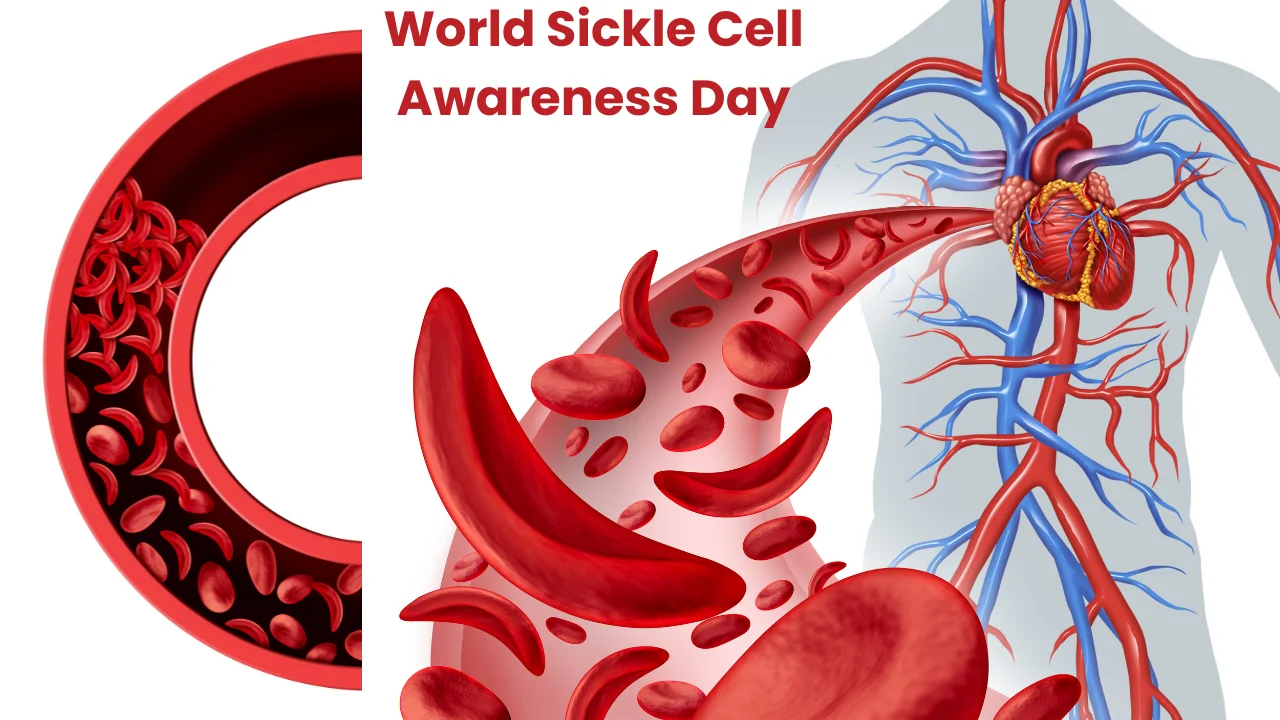World Sickle Cell Awareness Day 2024
World Sickle Cell Awareness Day is an annual event held on June 19th to raise awareness about sickle cell disease (SCD), a genetic blood disorder that affects millions of people worldwide. The day aims to educate the public about the challenges faced by individuals and families living with SCD and to advocate for improved healthcare services, research, and support systems.
World Sickle Cell Awareness Day Theme 2024
The Global Alliance of Sickle Cell Disease Organizations (GASCDO) recently announced the theme for World Sickle Cell Day 2024: Hope Through Progress: Advancing Sickle Cell Care Globally.
What is Sickle Cell Disease
Sickle cell disease (SCD) is a group of inherited blood disorders affecting millions of people worldwide. It alters the hemoglobin protein in red blood cells, causing them to take on a distorted, sickle-like shape. These abnormal cells are inflexible and prone to clumping together, blocking blood flow and causing various complications.
Causes and Genetics
- SCD is caused by mutations in the HBB gene, which codes for the beta chain of hemoglobin.
- It’s an inherited condition, meaning it can be passed from parents to their children.
- If both parents carry the mutated gene, their child has a higher chance of inheriting SCD.
Types of SCD
- There are several types of SCD, each with varying symptoms and severity.
- Common types include HbSS (most severe), HbSC, and HbAS (carrier state).
Symptoms of SCD
- Acute pain episodes (vaso-occlusive crises) are a hallmark symptom, caused by blocked blood flow.
- Other symptoms may include fatigue, jaundice, shortness of breath, delayed growth, and infections.
Complications of SCD
- Long-term complications can affect organs like the lungs, kidneys, heart, and brain.
- Early diagnosis and management are crucial to prevent complications and improve quality of life.
Living with SCD
- While there’s no cure for SCD, various treatments can manage symptoms and improve outcomes.
- These include pain management, blood transfusions, hydroxyurea medication, and potentially, bone marrow transplants or gene therapy in the future.
- Social support, advocacy, and access to healthcare are vital for individuals living with SCD and their families.
Awareness and Support
- Raising awareness about SCD is crucial to overcome stigma, improve diagnosis, and promote research for better treatments and potential cures.
- Organizations like the Sickle Cell Disease Association of America (SCDAA) and others provide support resources and advocate for individuals with SCD.
Way Forward
- SCD is a serious but manageable condition.
- Early diagnosis and proper treatment can significantly improve the lives of individuals with SCD.
- Advocacy, research, and access to healthcare are crucial for a brighter future for those living with SCD.
History of World Sickle Cell Awareness Day
World Sickle Cell Awareness Day, observed annually on June 19th, boasts a rich history intertwined with advocacy, awareness, and the fight for improved healthcare for individuals living with sickle cell disease (SCD). Let’s embark on a journey through its origin and evolution:
Seeds of Recognition
- While SCD has been known for centuries, it wasn’t until the 20th century that its complexity and prevalence gained wider recognition.
- In the 1970s, the Civil Rights Movement in the United States highlighted the disproportionate impact of SCD on marginalized communities, particularly Black Americans.
Birth of a Movement
- In 1978, the National Association for Sickle Cell Anemia (NASCA), later renamed the Sickle Cell Disease Association of America (SCDAA), was founded by parents and healthcare professionals.
- NASCA/SCDAA aimed to raise awareness, advocate for better care, and empower individuals and families affected by SCD.
Global Spotlight
- Recognizing the global burden of SCD, the UN General Assembly adopted a resolution in December 2008, officially establishing June 19th as World Sickle Cell Awareness Day.
- This landmark decision brought international attention to SCD and paved the way for coordinated global efforts to address its challenges.
Years of Progress
- Since its inception, World Sickle Cell Awareness Day has become a platform for:
- Raising awareness about SCD among the public and policymakers.
- Sharing information about symptoms, diagnosis, and treatment options.
- Highlighting the need for research and development of new therapies.
- Celebrating the resilience and achievements of individuals living with SCD.
- Advocating for equitable access to healthcare and social support services.
A Global Commitment
- Over the years, World Sickle Cell Awareness Day has sparked notable advancements in SCD research, management, and advocacy.
- International collaborations, awareness campaigns, and funding initiatives have contributed to improved understanding, diagnosis, and treatment of SCD.
Looking Ahead- World Sickle Cell Day 2024
- While significant progress has been made, challenges remain in ensuring equitable access to quality healthcare and comprehensive support for individuals with SCD worldwide.
- World Sickle Cell Awareness Day continues to be a vital platform to unite voices, advocate for change, and work towards a future where everyone living with SCD can thrive.
By remembering the historical context and ongoing significance of World Sickle Cell Awareness Day, we can collectively contribute to a world where SCD’s better understood, managed, and ultimately conquered.
Significance of World Sickle Cell Awareness Day
World Sickle Cell Awareness Day, commemorated every June 19th, carries immense significance, transcending mere raising of awareness. It serves as a crucial platform to:
- SCD disproportionately affects marginalized communities, particularly Black Americans and people of African descent. This day champions their voices, highlighting the challenges they face and advocating for equitable access to healthcare and resources.
- Lack of awareness about SCD fuels misdiagnosis, stigma, and inadequate support. This day dispels myths and educates the public about the disease, its symptoms, and the impact it has on individuals and families.
- World Sickle Cell Awareness Day isn’t just about raising awareness; it’s about advocating for concrete action. It serves as a call to action for policymakers, researchers, and healthcare providers to prioritize improved diagnosis, treatment options, and access to care for individuals with SCD.
- SCD is a global challenge, and tackling it requires a united front.
- Living with SCD requires immense strength and resilience. This day celebrates the remarkable individuals living with the disease, recognizing their achievements and raising their spirits amidst ongoing challenges.
- World Sickle Cell Awareness Day highlights the urgent need for continued research and development of new therapies, including potential cures, for SCD. It encourages increased funding and resources for groundbreaking scientific advancements.
- SCD awareness fosters empathy and understanding within communities, helping to break down the stigma and discrimination faced by individuals living with the disease. It promotes inclusivity and acceptance, creating a more supportive environment for those affected.
Ultimately, World Sickle Cell Awareness Day serves as a beacon of hope for a brighter future for individuals living with SCD. By illuminating the challenges, celebrating resilience, and advocating for change, we can collectively pave the way for a world where everyone with SCD can access the care and support they deserve to thrive.
19th June 2024 Special Day
19th June carries global health significance as advocates commemorate World Sickle Cell Awareness Day in 2024. Coinciding fittingly with midsummer when symptoms exacerbate, this annual observance confronts the realities of living with this inherited blood disease. The opportune timing provides a timely moment to spread awareness regarding sickle cell’s impact while promoting improved healthcare services globally. As activists and communities unite internationally on this particular 2024 date, the message resonates clearly – understanding sickle cell is vital for quality of life.
- Indian Bank Recruitment 2025 Out for 1500 Apprentice Posts
- Indian Bank Apprentice Salary 2025, Pay Scale, Salary Structure
- Indian Bank Apprentice Syllabus & Exam Pattern 2025, Check Details
- Railway RPF Syllabus 2024, Check Exam Pattern, Topic And Syllabus
- SSC JE vs RRB JE, Which Is Better? Know Detailed Comparison
- SSC CGL Study Plan 2025 For Next 25 Days With Tips, Tricks

Hello, I’m Aditi, the creative mind behind the words at Oliveboard. As a content writer specializing in state-level exams, my mission is to unravel the complexities of exam information, ensuring aspiring candidates find clarity and confidence. Having walked the path of an aspirant myself, I bring a unique perspective to my work, crafting accessible content on Exam Notifications, Admit Cards, and Results.
At Oliveboard, I play a crucial role in empowering candidates throughout their exam journey. My dedication lies in making the seemingly daunting process not only understandable but also rewarding. Join me as I break down barriers in exam preparation, providing timely insights and valuable resources. Let’s navigate the path to success together, one well-informed step at a time.






